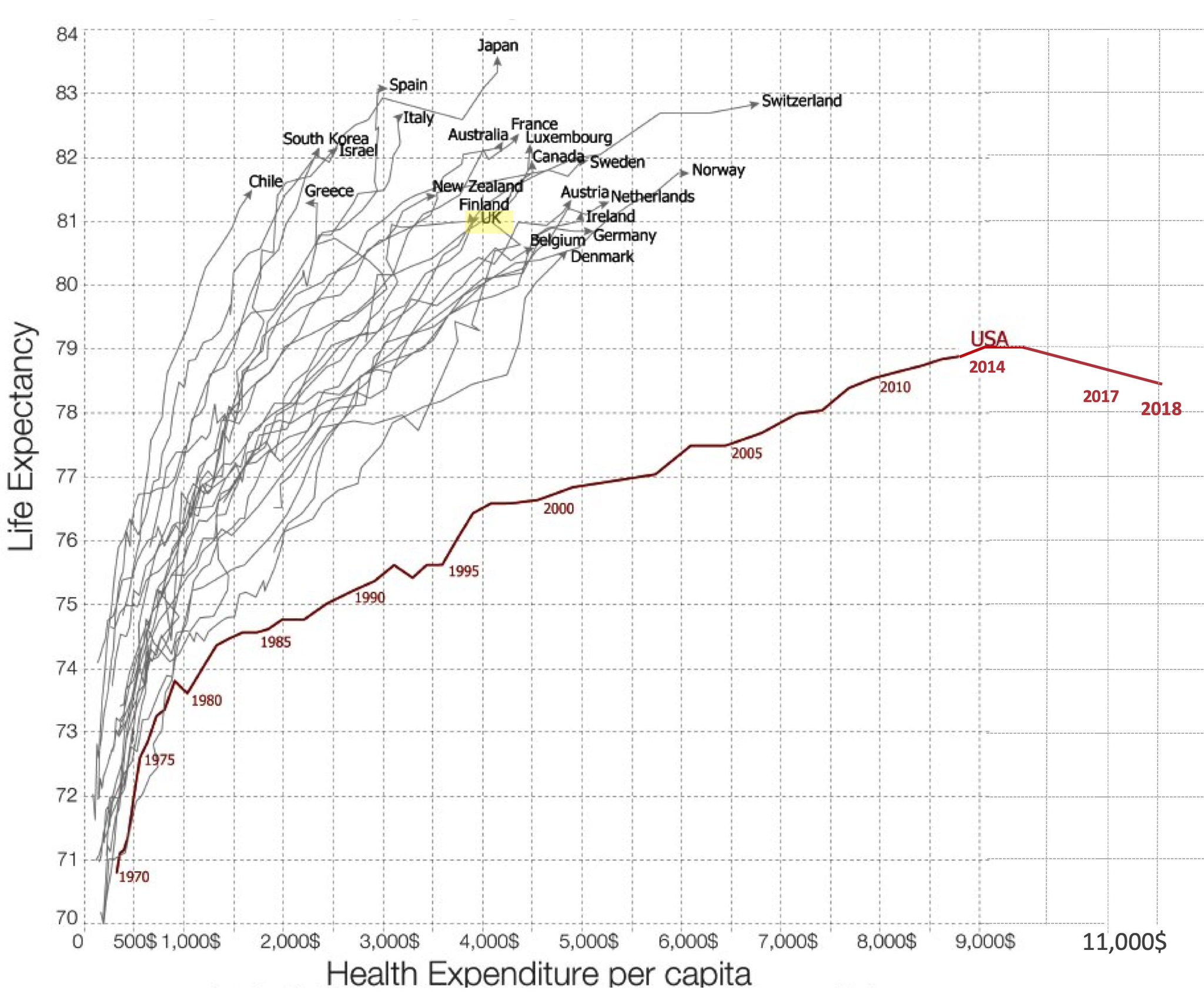With these simple investing rules in mind, I remain baffled with what is going on in the world of health care. For example, I read this morning that according to a recent national survey, a growing number of Americans would very much like to see a greater level of government spending on health care. Approximately 70% of survey respondents felt that the government is spending "too little" on improving national health, which is increased compared to similar surveys conducted in 2016 (in which 62% of Americans felt that government was spending "too little" on improving health) and 2014 (in which 56% of Americans felt that government was spending "too little" on improving health). Importantly, while individuals who self-described themselves as Democrats were more likely to say that we don't spend enough on improving health, there was a significant increase across both party lines. In other words, the feeling is pretty widespread.
More on the survey in a minute. The ABC News political analyst, Matthew Dowd tweeted out something this morning that is relevant to the current discussion: "On the metric of “life, liberty, and the pursuit of happiness”, we are not doing well. America ranks in the world: 64th in life expectancy, 27th in healthcare, 23rd in freedom index, and 19th in happiness index. It is time we look to other countries, and reform our structures." While Mr. Dowd doesn't outright say it, he is alluding (I think) to an oft-repeated concept that the U.S. spends far more on health care compared to every other developed country, yet fares far worse on outcomes such as infant mortality and life expectancy. As an example, we are one of the only countries in which overall life expectancy is declining!
Similarly, a few weeks ago, the noted physician and author, Eric Topol tweeted out the following: "The #US now spends more than $11,000 per person for healthcare, while the #UK ~ $4,000. Yet life expectancy has declined in the #US for each of the past 3 years, while it continues to increase in the #UK." In order to support his case further, Dr. Topol added the following graphic from @OurWorldInData:

It's a pretty amazing graph with some pretty amazing statistics. But here is my point, and I don't think I can emphasize it enough. I absolutely and 100% agree that the U.S. health care delivery system needs to be improved in a MAJOR way. However, to say that outcomes such as life expectancy and infant mortality are measuring the quality of health care delivery is not completely accurate (I would even venture to say that life expectancy and infant mortality have very little to do with the actual delivery of health care). Do I believe that these are important measures to follow? Absolutely. Do I think the U.S. needs to be doing much better in these two measures? For certain. Do I think investing more money in health care will impact these measures in a significant way? Absolutely not.
Dr. Sanne Magnan published an article on October 9, 2017 entitled "Social determinants of health 101 for health care: Five plus five" that really deserves a look. Dr. Magnan makes the following major point - "As a determinant of health, medical care is insufficient for ensuring better health outcomes." As a matter of fact, medical care contributes very little to the modifiable determinants of a healthy population (probably only accounting for 10-20 percent of healthy outcomes). The so-called "social determinants of health" (healthy lifestyle choices, socioeconomic factors, and environmental factors) account for 80-90 percent of population health outcomes, such as life expectancy and infant mortality. In other words - life expectancy and infant mortality are measures of health, not health care delivery.
Back to my original point about investing. The simple fact is, that we, as a nation, are investing our money poorly. If we really want to make an impact on health, we should be spending more money on addressing the things that will actually have an impact on health. If we really want to improve the health of our population, we need to invest wisely on addressing the social determinants of health - for example, lifestyle choices like whether to smoke or drink alcohol, whether or not to wear a seatbelt, whether or not to eat healthy foods. Similarly, we need to make sure that everyone in the U.S. has access to nutritional, healthy foods, clean water, good housing, and good preventative care. Does our health care system bear some responsibility for prevention? Absolutely. But to say that the health care delivery system is completely at fault is the wrong approach.
Dr. Elizabeth Bradley, a health policy researcher and President of Vassar College wrote an excellent book on this very subject a few years ago, called The American Health Care Paradox: Why Spending More is Getting Us Less. The book should be required reading for anyone in the health care profession and can be summarized with just one graph:
As it turns out, in the aforementioned national survey, the majority of Americans also feel that the government invests "too little" in things such as "assistance to the poor" (71%), "dealing with drug addiction" (69%), and "social security". It's not rocket science. Unfortunately, words do not always translate to action. We need to do better.


Thank you for summarizing the difference between “health care” and “health” in a more straightforward manner than I have been able to put to words. The broad amenities that our society values - like good education, parks and recreation opportunities, accessible health services, social services, responsible firearm policies - never seem to transfer up to our lawmakers. That problem is a whole other animal.
ReplyDelete